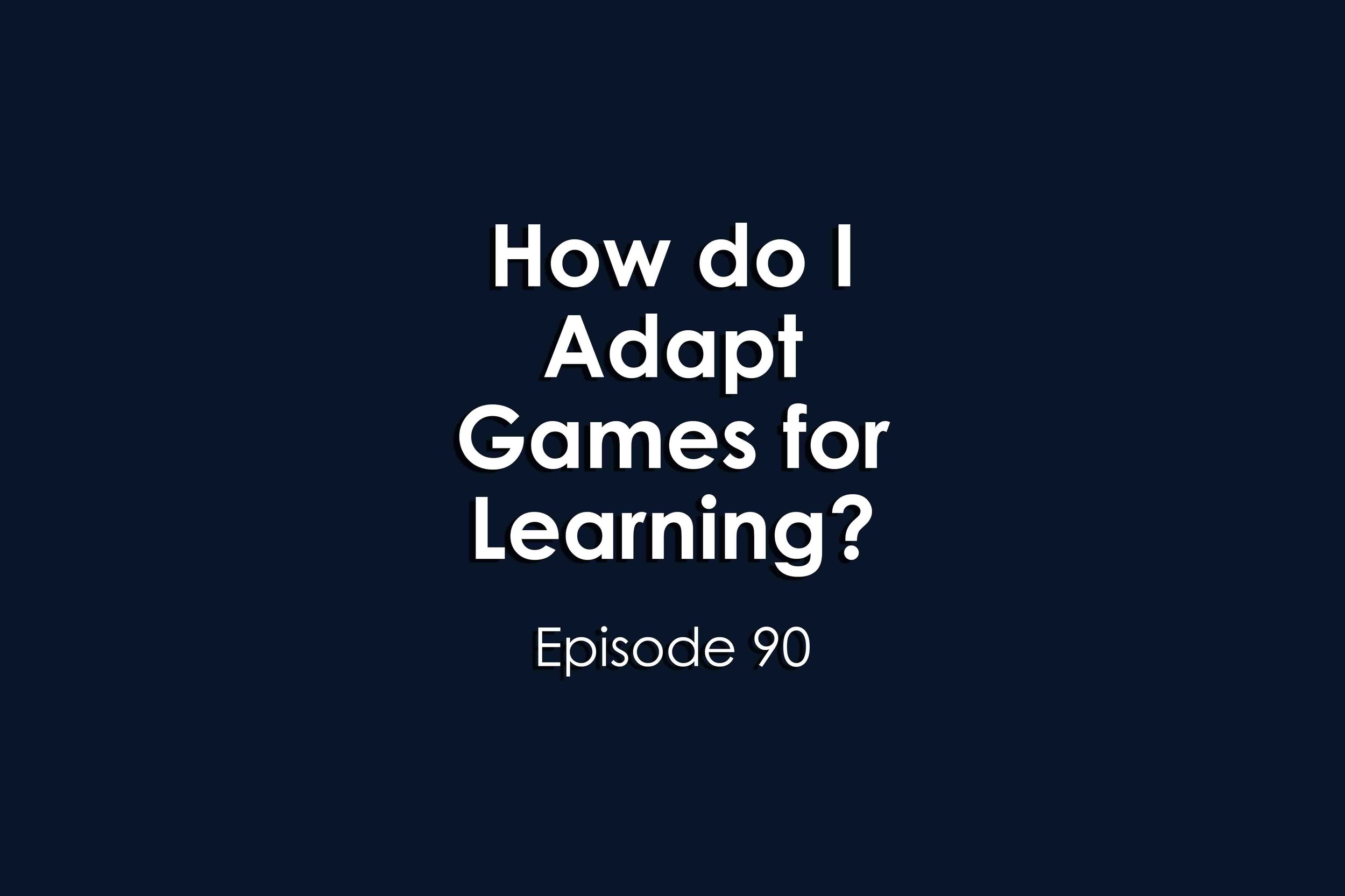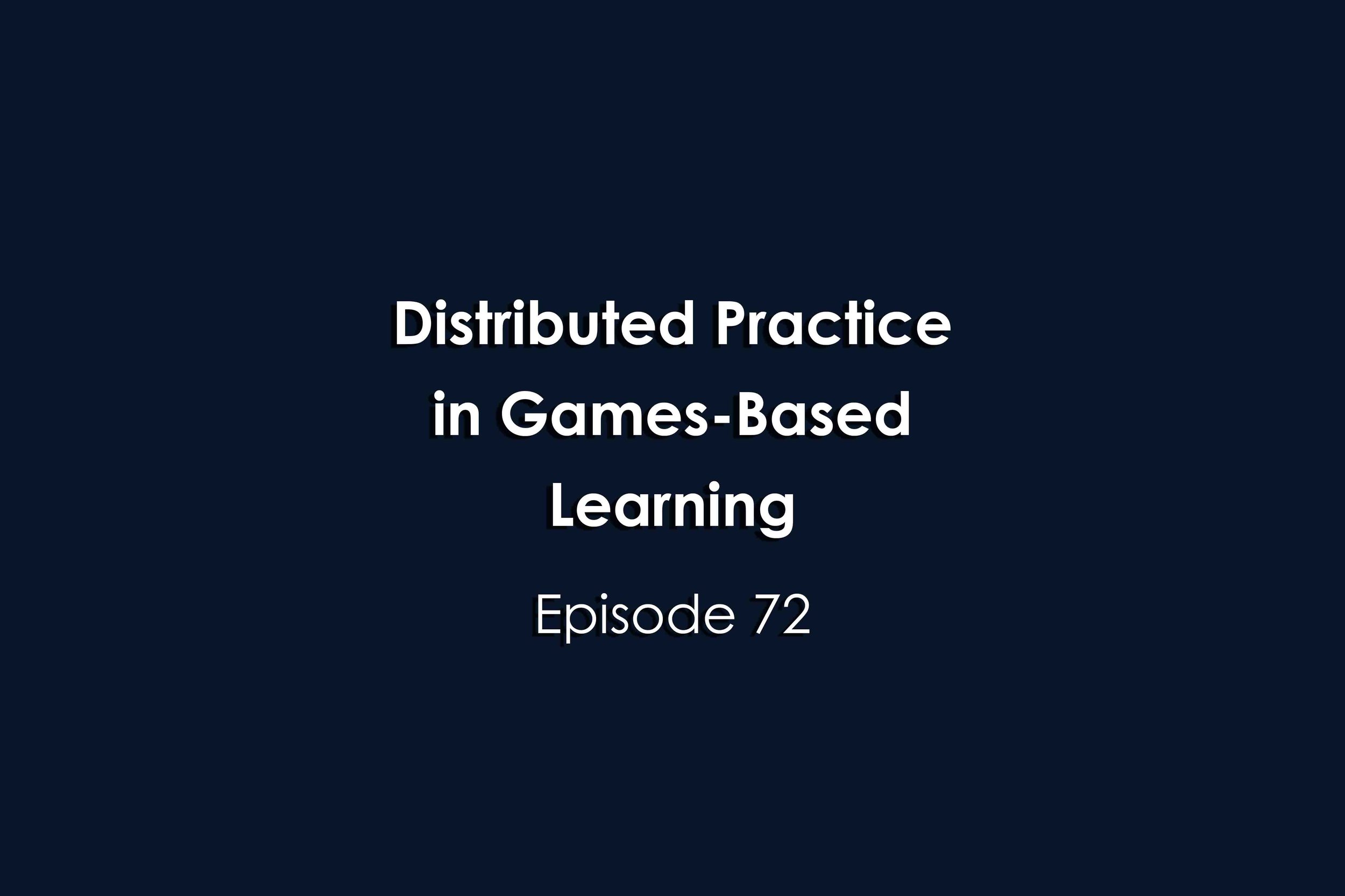In this episode of Experience Points, Dave Eng chats with Travis Windleharth from foundry10 about games-based learning. Travis, with a background in science education, museology, and information science, focuses on how games shape youth's understanding of STEM concepts. Foundry10, co-founded by Gabe Newell, is explored, emphasizing its pillars—programs, philanthropy, and research—and their role in expanding learning perspectives. Travis discusses his role in the STEM design-based research lab, aligning with interest area teams. The episode concludes with insights into foundry10's collaborative approach to research and program design.
Read MoreIn this podcast episode, host Dave Eng interviews Dan White, founder of Filament Games, discussing the intersection of education and gaming. Dan's journey from teaching to game development is explored, emphasizing the challenges of creating engaging learning experiences. The concept of "pleasing frustration" is covered, where games strike a balance between challenge and support to maintain learner engagement. The conversation delves into game mechanics and their role in learning, citing examples like the game "RoboCo." The alignment of games with educational standards and the promotion of problem-solving skills are also discussed. The episode concludes with insights into Filament Games' philosophy on innovation and continuous improvement.
Read MoreEpisode Summary:
In this episode of "Experience Points" Dave Eng interviews Andrew Harris, a game designer, therapist, and educator behind The Guild Chronicles program. Andrew discusses the origins of The Guild Chronicles, a transformative game-based learning program he developed, which combines tabletop RPG elements with therapeutic and educational objectives. The program focuses on fostering social-emotional growth, collaboration, and teamwork among autistic youth. Andrew explains how the game mechanics encourage players to work together, solve challenges, and develop skills in a safe and engaging environment. He highlights the narrative elements that make the intervention unique and effective, helping players learn and grow through shared experiences. To learn more, visit GuildChronicles.com.
On today’s episode, we’ll answer the question “What are Tactics?” Tactics are one of those concepts often discussed by gamers and designers alike. Especially when it comes to addressing playstyles, design, and competition. Tactics are often compared to strategy in this regard. But what exactly are tactics and how do they compare against strategy and strategic decisions?
Read MoreIn this episode of the Experience Points podcast, host Dave Eng interviews Terry Pearce, founder of Untold Play, a games-based learning expert. Pearce discusses how he helps trainers, educators, and designers incorporate gamification into learning programs. He highlights his work with organizations like HSBC and the NHS, adapting complex topics like project management into interactive games. Pearce shares his process of tailoring existing materials using gamification principles, mentioning frameworks like Octalysis and Lazzaro's Four Keys to Fun. Listeners can connect with Terry Pearce through his website www.UntoldPlay.com or on LinkedIn for more insights into games-based learning and gamification.
Read MoreIn this episode, Dave Eng speaks with Stefan McNinch, a former elementary education teacher turned game designer who founded UnBoxEd, a nonprofit program using board games to engage low-income students in social-emotional learning, history, STEM, and entrepreneurship. Stefan shares his experience using games-based learning, including RPGs, to empower students to take ownership of their education and explore their identities through character development. He discusses the challenges of dealing with diverse student personalities and the importance of understanding individual experiences to create effective learning experiences. The episode emphasizes the value of personalized learning and using player types to enhance classroom management and behavioral learning.
Read MoreIn this episode of "Experience Points" by University XP, Dave Eng and Naomi Pariseault discuss the educational value of the board game "HerStory." They explore its gameplay mechanics, the connection to learning design, and its potential as a tool for teaching and learning. The game allows players to become authors, writing a book about remarkable women in history. They delve into the game's abstraction of research and its tight connection to the goal of publishing. Both Dave and Naomi also discuss the game's accessibility, its potential for serious games in education, and how it inspires players to tell women's stories.
Read MoreIn this episode of Experience Points by University XP, host Dave Eng interviews Dr. Ray Kimball, the founder of 42 Educational Games Coaching and Design. Kimball discusses his experience teaching at West Point and how he incorporated games into his curriculum. He also talks about his decision to retire from the army and start 42Ed Games to help higher education faculty integrate games into their teaching. Ray explains how he assesses classroom and institutional contexts to find the best game for a particular faculty member and how he helps faculty members design educational games. Kimball emphasizes the importance of understanding institutional context when selecting games for a faculty member and shares examples of how different institutions may require different types of games. Ray’s approach offers faculty members an easy way to integrate games into their teaching while ensuring that the games are a good fit for their institution.
Read MoreOn today’s episode we’ll answer the question “How do I Adapt Games for Learning?” Most people know games as vehicles for fun, entertainment and socialization. Elements of games – through gamification – can also be used to augment, change, and influence individuals behaviors. Those behaviors can affect the way that they interact, shop, and travel.
Read MoreOn today’s episode we’ll answer the question “What is Player Relevance?” Players play games for multiple different reasons. Many of those reasons have to do with their sense of intrinsic or extrinsic motivation. No matter the reason, all players play games because they find them relevant. For themselves, as well as for their player character, and through their journey throughout the game.
Read MoreOn today’s episode we’ll answer the question “What is Player Scaffolding?” Many people can just jump right into games. They take one look at it and they already “get it” and know how to play. Whereas other people need a little bit of help. Sometimes this comes in the form of instruction; teaching; or learning from other players.
Read MoreOn today’s episode we’ll answer the question “What is Player Reflection?” Games-based learning is a form of experiential learning. Through games-based learning players experience something concrete such as game play. Instructors, educators, and moderators then lead learners through debriefings in order help them best make sense of that experience. That debriefing also includes some kind of player reflection of that experience. But what is that player reflection? What process do players use to reflect on their experiences? How will that kind of reflection influence and affect how they learn through games-based learning?
Read MoreOn today’s episode we’ll answer how to Debrief Games-Based Learning. Using games for teaching and learning is the basis for games-based learning. But, educators and instructors don’t just play games with students or ask their students to play games. Instead, games serve as a critical and fundamental part of the curriculum for helping learners grow. That’s accomplished by making sure that a proper debriefing has occurred after game play.
Read MoreOn today’s episode we’ll answer the question: “What is Expectancy Theory?” Thinking about why we do something is often a central part of all of our activities. Those include why we work, play, or form relationships with one another. This is the central aspect of motivation: knowing what will happen or occur as a result of our own actions.
Read MoreOn today’s episode we’ll cover Applied Games-Based Learning. Games-based learning can be a powerful tool for educators. That’s because it allows them to use established games for teaching, learning, training, and education. But how exactly do you apply games-based learning? What specific learning outcomes can you target? What games are specifically available to meet the needs of your students?
Read MoreOn today’s episode we’ll cover Playing Serious Games. Serious games are games created from the ground up for teaching and learning. These also include games created for a social purpose outside of the more tradition paths of games for entertainment.
Read MoreOn today’s episode we’ll examine Distributed Practice in Games-Based Learning. You are probably familiar with “cramming” and studying as much as possible in the time leading up to a test. The opposite of this is “distributed practice.” Distributed practice is where students study in small increments leading up to a test or quiz.
Read MoreOn today’s episode we’ll answer the question: “What is Constructivism?” Learning is the transformation of experience into knowledge. That means that learning is the construction of knowledge through the learner. We are learning when we are playing games. When we play games we are actively constructing the framework for how we play, understand, and interact within the game world.
Read MoreThis episode will provide an overview of self-determination theory and how the three needs of autonomy, competency, and relatedness influence player motivation. Intrinsic vs. extrinsic motivation will be discussed in addition to how feedback loops affect the player experience. Self-determination theory in its application to both games and games-based learning will be shared. Self-determination theory’s applications outside of games and teaching will also be discussed.
Read MoreUsing games as a medium for learning is called games based learning. Often times these games are created from the ground up to be used for teaching and learning. These are usually simulations or serious games. However, games can also be adapted for educational purposes. These are called learning games.
Read More




















